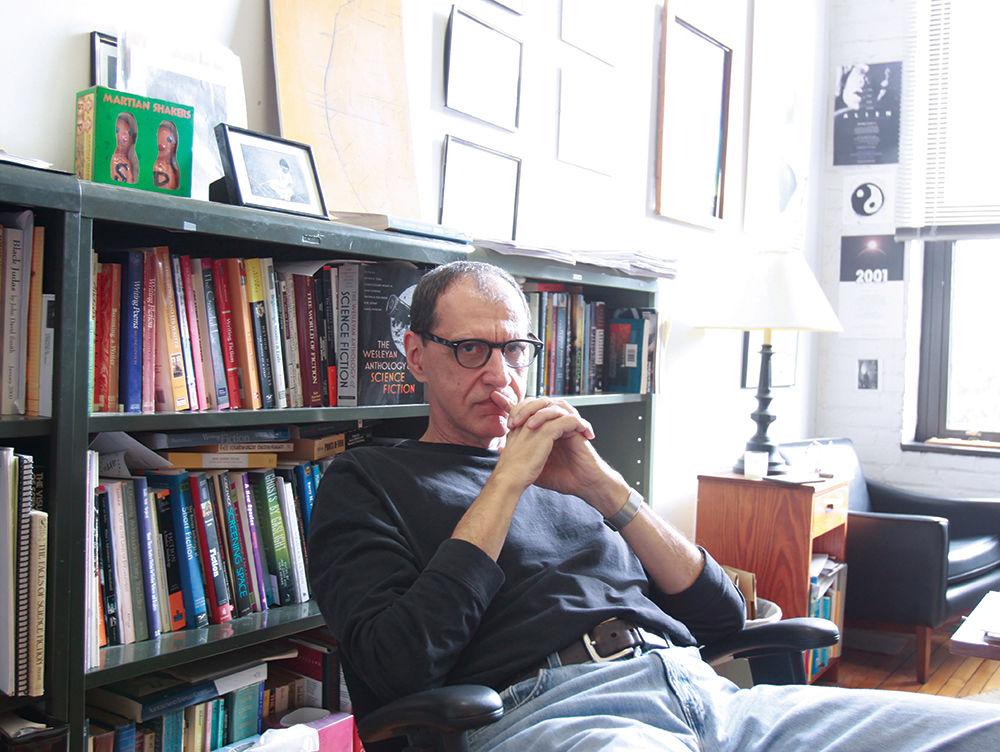It’s a warm, winter afternoon and John Kessel, a professor in the university’s M.F.A. program in creative writing, is sitting in a tattered black chair. His already compact office is made narrower by piles of books scattered around, some his own works, some those of his previous students, others by authors all across the world.
His computer sits on the desk in front of him and eventually goes dark before his screensavers kick in, flashing images of stars and galaxies. Kessel obtained a bachelor’s from the University of Rochester in physics and English; not a common degree combination for a creative writing professor.
“When I was in undergrad it was funny because the classes in physics that I had to take were scheduled at the same time as the English classes I needed to take because no one was ever taking both of them, so why would they bother not conflicting those schedules,” Kessel said.
When entering his college career, Kessel wanted to be an astrophysicist. Now, as a creative writing professor, he connects the two through his love for science fiction, one of his favorite genres to teach.
The MFA program in creative writing is a two-year program that’s divided into two sections, poetry and fiction. Kessel said that including himself, there are three professors who teach in the fiction section of the program, and that they are currently reviewing the applicants for next year.
“For fiction, there are over one hundred applicants for seven slots,” Kessel said. “The people who get in are really very accomplished writers.”
When applying to the program applicants have to submit many, many things, one of those being 40 pages of their own written work. This piece of the application is examined very carefully.
“There are a number of things we look for,” Kessel said. “At the very least we want [applicants] to have a good command of the English language, showing they know how to write good English prose. What I’m looking for is I want them to tell a story, one that has characters and situations that are interesting.”
Another important component to an applicant’s written submission is originality. To gain acceptance into the program, it is important to be a writer, not just a rewriter.
As a professor in this program, Kessel teaches workshop classes where students will work on their novels or stories and then submit them to the workshop so that they can be read and evaluated by the other students. Alongside teaching in the classroom, Kessel does a lot of individual work with his students outside of class time.
“They have to write a book to get their degree,” Kessel said. “It has to be 200 pages or more of fiction. Sometimes it’s collections of stories, sometimes it’s a novel. Then I work with them on their manuscripts. So, it’s a lot of one-on-one work with the students. The writing classes are small, so I’m reading a lot of manuscripts and writing a lot of critiques.”
“[Kessel] is somehow frenetic and methodical at the same time,” said Tony Quick, an alumnus of the MFA in creative writing program. “He taught me that you can bring a lot of energy to your fiction while also helping me to understand that fiction is a process. You can be analytical with fiction while also finding ways to have fun with the genre.”
When dealing with the strengths and weaknesses of his students, it’s important to understand that each individual starts out differently from others, according to Kessel. One of his student’s strength is another one of his student’s weaknesses.
“If you just tell people ‘oh this is a terrible story, stop writing it’, it’s not very helpful,” Kessel said. “You need to encourage people, but you also need to be honest. And, so, it’s a little balancing act of spotting those things that are worth encouragement and being seriously honest about those things that need more work.”
More than just a creative writing professor, Kessel is an accomplished author himself. His sixth novel“Pride and Prometheus”was just published on Feb. 13. This book is set in a world where Mary Bennet from Jane Austen’s “Pride and Prejudice”meets Victor Frankenstein from Mary Shelley’s “Frankenstein.”
“The main character in my book is Mary, the middle sister of the Bennets,” Kessel said. “She’s the one who plays the piano and is awkward and she’s the only one that isn’t pretty, and so I made her the main character.”
This Wednesday, Kessel will be reading from his newest novel in Titmus Theatre located in Thompson Hall from 7:30-9:00 p.m.













